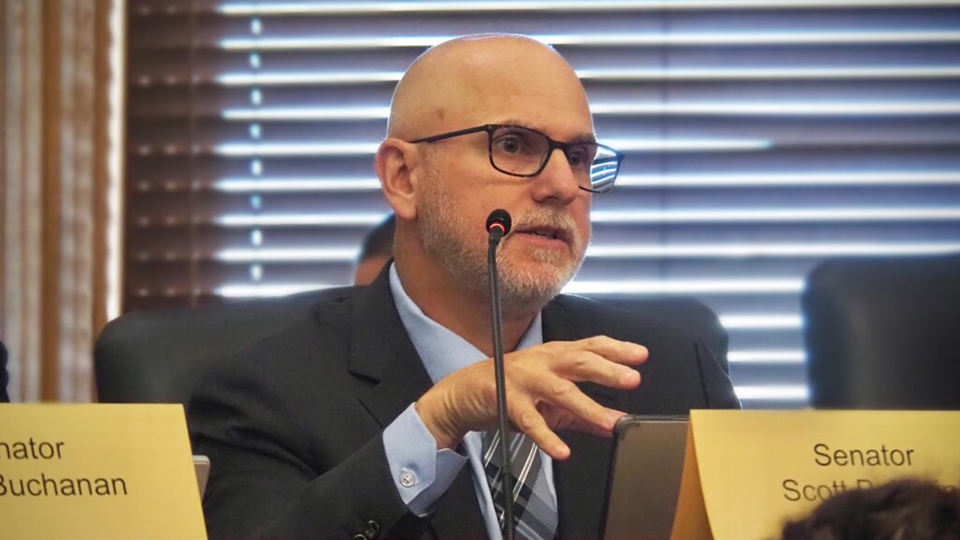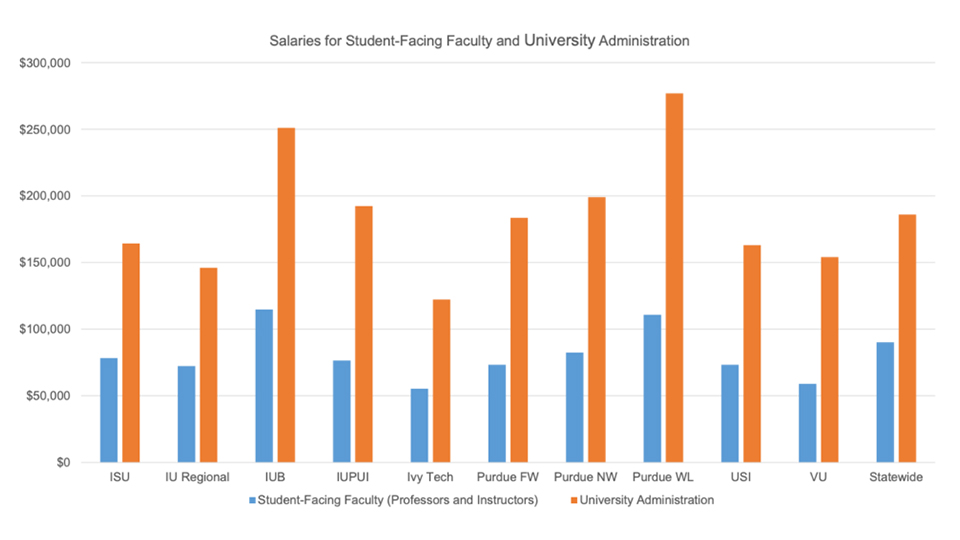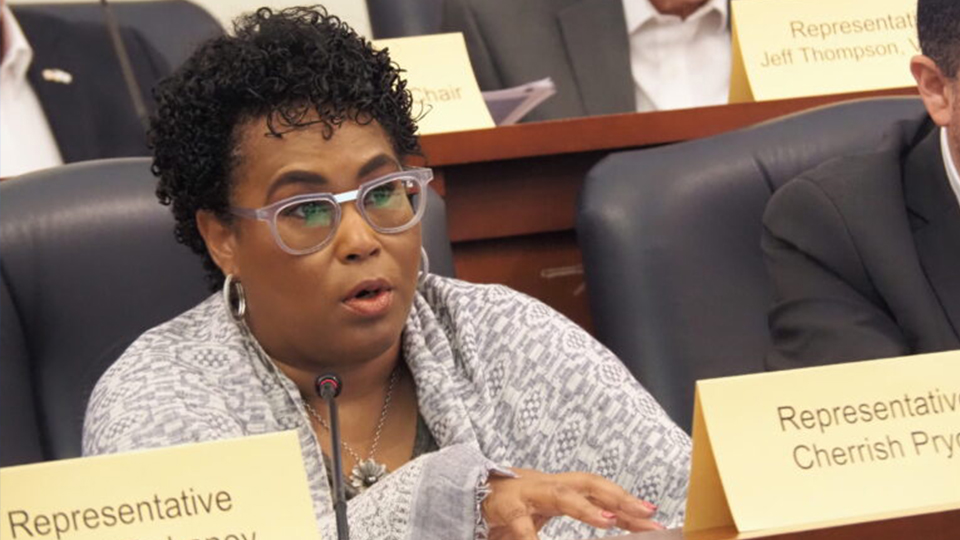Lawmakers push for better higher education cost, debt data
Subscriber Benefit
As a subscriber you can listen to articles at work, in the car, or while you work out. Subscribe Now
Indiana lawmakers on Tuesday reviewed the results of a “first-of-its-kind” request of higher education cost and debt data — and found it lacking.
The data was riddled with holes from institutions unable to submit the desired data in the correct format or within the narrow timeframe allowed, and peppered with limitations.
“I think we don’t have the data to say anything at this point,” said Rep. Jeff Thompson, R-Lizton, at the interim study committee on fiscal policy’s sole meeting Tuesday. He is vice-chair.
Policymakers should reframe their requests and allot more time for data collection, said the nonpartisan agency tasked with conducting the analysis.
Legislators also critiqued the universities for declining to present before the committee, pointing to the institutional representatives observing silently from the back row of the room.
Student loan debt down
The interim committee asked more than a half-dozen public higher education institutions for student loan debts, alumni salaries, staff salaries, program provision cost and more.
It made its initial request in August and gave the institutions — including Ivy Tech Community College, Ball State University and multiple Purdue University campuses — less than six weeks to hand over data in mid-September. But they worked up to Monday night on some elements, Indiana Legislative Services Agency Fiscal Analyst Austin Spears told lawmakers.
Spears cautioned multiple times that the institutions often defined and recorded metrics differently, complicating his agency’s attempts to compare data across institutions. Small program sizes at given degree levels also meant small — and volatile — sample sizes, he said.
Still the agency found that the average Hoosier higher education student owed less in debt in 2022 compared to a decade prior, even without accounting for inflation.
Those who obtained short-term certificates from Ivy Tech in 2012 owed more than $8,000 on average, but 2022 graduates owed less than $1,000 on average, according to Spears’ slides. Vincennes University reported a drop from about $11,000 in loan debt to $8,000 during that time period.
Students who obtained long-term certificates and associate degrees in 2022 also owed less debt on average compared to 2012, also in non-inflation-adjusted dollars — except at Ball State University.
Spears noted smaller loan debt declines for bachelor’s degrees, and a “mixed bag” for master’s and doctoral degrees.
Student costs, staff pay disparities
The Legislative Services Agency also examined the cost to students to complete different degrees, with tables noting each institution’s most and least expensive programs. But even that information came with caveats.
Oddly high and low dollar amounts — like a $40,000 short-term certification in multimedia design at the Indiana University regional campuses — prompted Spears to warn of possible “data issues.”
Ball State wasn’t able to provide the data required and was excluded, and Vincennes could only offer partial information.
Rep. Ed DeLaney, D-Indianapolis, also observed that the costs reported were “sticker prices.”
“That’s not what everyone pays,” he said, after scholarships.
What students and their families actually owe, DeLaney said, is “the essential question.”
The Legislative Services Agency also collected data showing massive disparities between student-facing faculty — even excluding adjunct educators — and administrators.

Spears said formatting this information was also challenging, as some institutions may have converted faculty pay to full-time salaries differently, and may or may not have included other benefits in those calculations.
One school takes lawmakers up on offer
Seven institutions submitted narratives fleshing out their data, but just one presented before the committee Tuesday, prompting rebuke from some legislators.
Ivy Tech’s vice president of legal and public affairs, Mary Jane Michalak, told lawmakers the community college was working diligently to lower costs beyond just tuition and fees.
“That is a huge cost to students, and that is a cost that is not transparent to students when they … sign up for a class,” Michalak said. She cited research showing that students who can’t afford materials often go without.
Ivy Tech, after years of planning, has negotiated prices for course materials, with the next school’s rate set for $17 per credit hours. Last year, even at a slightly higher rate, the program saved students nearly $74 million.
Just 123 eligible students opted out of the initiative, according to Michalak.
She said Ivy Tech has also stopped including loans by default in student financial aid packages, and sends letter annually showing students how much in debt they’ve already racked up. Students are now taking out less in loans, she said.

Lawmakers thanked her for the presentation — and turned a mild ire to those that hadn’t presented.
“The offer was made to all the universities but only Ivy Tech was the one that took you up,” Rep. Cherrish Pryor, D-Indianapolis, said.
“That is correct. But there are several sitting in that back row back there,” Chair Travis Holdman, R-Markle, said. But he noted that all had filed narratives.
“I appreciate your cover that you’re offering. But I’m gonna go back to: I think it would have been nice,” Pryor said. “… Particularly since a significant amount of the funding does come from the Indiana General Assembly. And it is our responsibility to be good (keepers) of the state dollars, and eight minutes is not a lot of time to ask to present for us.”
The committee at first had no recommendations, but Sen. Fady Qaddoura, D-Indianapolis, said that might reflect poorly upon the body.
DeLaney advocated for an immediate update to the analysis using full data, adding that if lawmakers tried to compare the current attempt to an update two years from now, they wouldn’t be comparable.
“Let’s finish the job,” he said.
The committee adopted a recommendation to have stakeholders convene and settle on parameters for data collection, and to hopefully have that data before the group meets again next spring.
The Indiana Capital Chronicle is an independent, not-for-profit news organization that covers state government, policy and elections.
